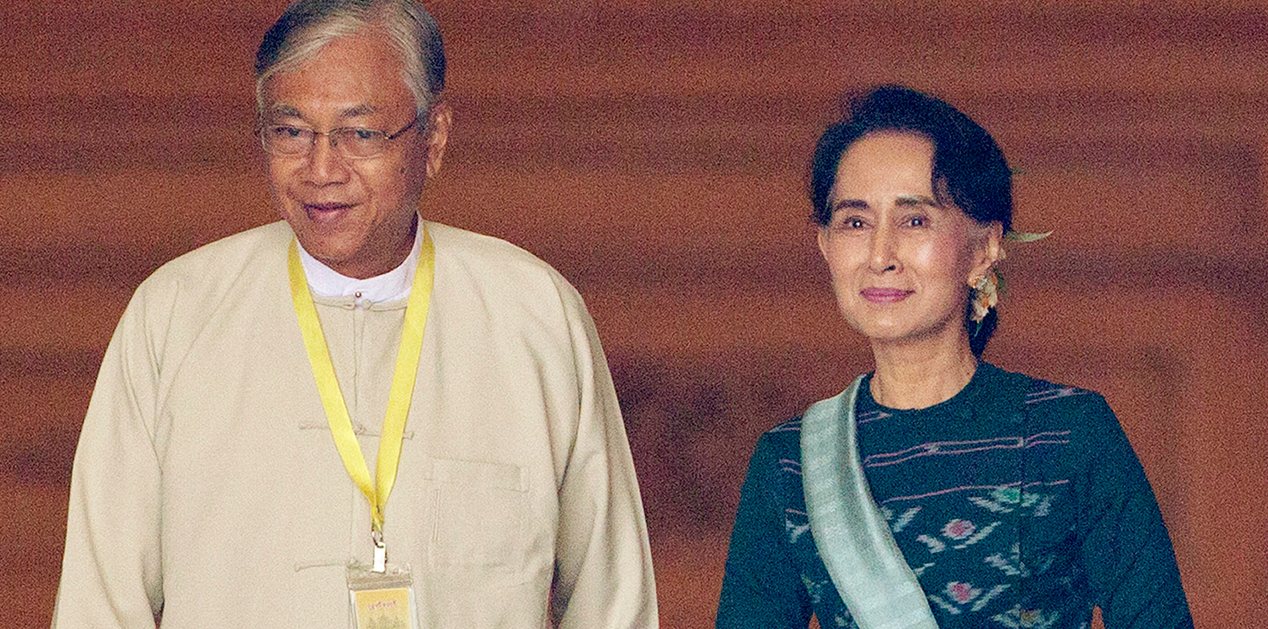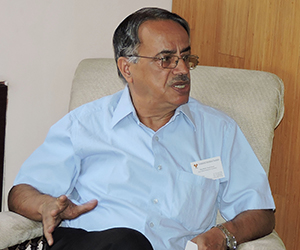The new government in Myanmar headed by President Htin Kyaw of National League for Democracy though de facto led by Aung San Suu Kyi has completed over two months in power. The current Myanmar regime faces many daunting challenges both at home as also in its evolving relationships with neighours and other major powers.
Internally, speeding up the peace process and reconciliation with the numerous ethnic armed groups of Myanmar remains one of the key issues that need to be dealt with in an earlier timeframe.
Aung San Suu Kyi who has become a State Counsellor and looks after four portfolios has taken on the task of bringing about peace and reconciliation through what she describes as a 21st Century Panglong Conference. Going back in history it was Gen. Aung San, father of Suu Kyi and a well respected leader of Burma who had convened Panglong Conference in 1947. The overall objective then was to obtain independence from the British and keep Burma unified as a union of states by giving a degree of autonomy to the federated units. Ethnic minorities’ leaders since independence have been struggling to realize the fruits of the Panglong agreement reached subsequently after the independence.
On the other hand Tatmadaw led by Commander-in-Chief Senior-Gen Min Aung Hlaing has a history of supporting a unitary system of government as opposed to a federation of states as agreed to in the Panglong Agreement. Further, in the last six months and especially so in the past one month many ethnic armed groups like Kachins, Ta’ang National Liberation Army (TNLA), Myanmar National Democratic Alliance Army (MNDAA) and Arakan Army (AA) have been involved in clashes with Myanmar armed forces. All such groups were excluded from the National Ceasefire Agreement reached in October 2015. There is a view that approaches of the current government and the Tatmadaw to the ethnic armed groups is at variance and therefore resolution to the issue is unlikely in the near future. Given the nature of distribution of power in Myanmar, military’s say in reaching accommodation with the armed groups cannot be overlooked.
Last month in a meeting at Nay Pyi Daw, Gen. Min Aung Hlaing said that all ethnic armed groups must abide by the ‘peace principles of the Tatmadaw’, and stick to their designated areas to avoid clashes, so thatpeace can be achieved through the current political system.
While the new government is occupied with internal issues the major powers have been reaching out to the new government in a bid to realize their politico-strategic, economic and security interests in Myanmar. First off the block was China who sent its Foreign Minister Wang Yi to Myanmar in the first week of April to bolster its ties with the new regime. Not only Wang Yi met his counterpart Suu Kyi he also met the head of the other power centre in Naypidaw, that is, Gen. Min Aung Hlaing. China has been cultivating Aung San Suu Kyi for some time now; last year much before the elections she visited China on invitation from the Beijing leadership. Despite the fact that some the Chinese projects like Myitsone Hydropower are in suspension China’s influence in Myanmar remains quite considerable.
Suu Kyi on her part knows very well that Myanmar needs Chinese help in the shape of funds and in many other ways for both national reconciliation and economic development even while with the opening up of Myanmar the Western countries and India are looking at opportunities to invest in Myanmar.
Last two months have also witnessed high profile visits by US Secretary of State, John Kerry, Japan’s Foreign Minister Fumio Kishida, foreign ministers of some European countries as also visits from Thailand, Vietnam and Singapore. The overall objectives of such visits have been to express support to the ongoing transition in Myanmar and to the new government in Myanmar. For instance, during John Kerry’s visit, the US eased many sanctions placed on Myanmar. However, some of the sanctions especially on certain individuals and some groups remained. John Kerry during a joint conference in Nay Pyi Daw with Aung San Suu Kyi stated “The key to the lifting of the (remaining) sanctions is really the progress that is made within Myanmar in continuing to move down the road of democratization.”
Fumio Kishida said that “We’ll cooperate with the Myanmar government to create a climate that will benefit both the people of Myanmar and Japanese businesses”. He promised to spur job creation and bolster the development of Myanmar’s agricultural, education, finance, health care and infrastructure sectors.
However, largely there is an absence of pro-active engagement by India with the new government even though New Delhi considers Myanmar as the lynchpin in its ‘Act East Policy’ as also as a strategic land bridge to the ASEAN community. Notwithstanding the fact that Ms. Nirmala Sitharaman, Industry & Commerce Minister was the first Minister from India to visit Myanmar from 18 to 20 May after the new government took over in Myanmar there appears to be a degree of reticence and tardiness in reaching out to the new dispensation. She led a 25 member delegation of Indian CEO’s to an India-Myanmar Business Conclave at Yangon where she also had discussions with Mr. U Win Khaing, Myanmar Minister for Construction, Dr. Than Myint, Myanmar Minister for Commerce and U Khin Maung Cho, Myanmar Minister for Industry. The visit seems to have been confined to Yangon only without calling on Aung San Suu Kyi the new power centre in Nay Pyi Daw.
On the Indo-Myanmar security front some elements of CorCom, an umbrella group of anti-Indian insurgents with bases in Manipur and Myanmar had ambushed Indian troops of Assam Rifles and killed six of them on 22 May. As a response Indian forces launched a joint operation on 25 May against these insurgents hiding across the Myanmar border and killed 8 insurgents and captured 18 insurgents who were later handed over to Myanmar authorities. These developments were not covered in Myanmar media though some of the Indian media covered this event to a very limited extent.
Last year after a similar incident wherein Indian troops had carried trans-border operations to neutralize the Naga militants hiding in camps along the Indo-Myanmar border after killing Indian troops Aung San Suu Kyi had remarked that there should be ‘transparency’ regarding such operations. Speaking about Prime Minister Modi, Aung San Suu Kyi called him “a rather reserved person” and had also made some other innocuous remarks regarding expecting more from Indian democracy.
Possibly, South Block might have some reservations about such remarks. But all this was before Myanmar’s November 2015 elections as also this time after the incident along the border no such remarks have been made. There is much at stake for India to quibble over such trivial issues; if indeed such is the case. It is time that Prime Minister Modi or at least our External Affairs Minister visits Myanmar. As ‘neighbourhood first’ is the leitmotif of our foreign policy Myanmar needs to be engaged at the highest political level. Besides their military leadership also needs to be engaged and visit by our Defence Minister and defence services chiefs should follow in due course. A strong political, economic and security relationship with Myanmar remains an important imperative if the goals of our ‘Act East Policy’ are to be realized.
Published Date: 13th June 2016, Image Source: http://www.abc.net.au
(Disclaimer: The views and opinions expressed in this article are those of the author and do not necessarily reflect the official policy or position of the Vivekananda International Foundation)











Post new comment